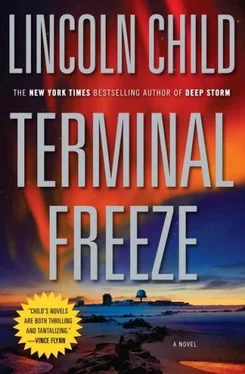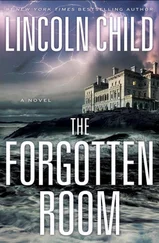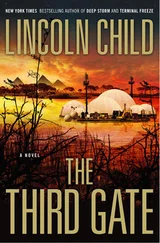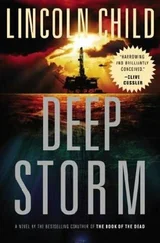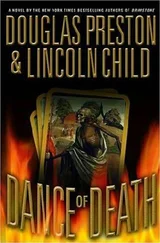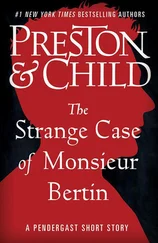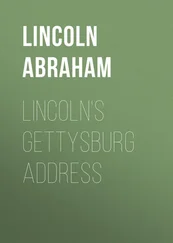“If that is true, I apologize. But I think violent death is too high a price to pay for our ignorance.”
Usuguk closed his eyes. “The circle you have begun is yours to complete. Even the Circle of Death can be beautiful.”
“There was no beauty in Josh Peters’s death. If you know something, no matter how insignificant or unrelated it may seem-you owe it to us as fellow human beings to aid us.”
“You are of the world,” Usuguk replied slowly. “I am of the spirit. I left that life behind long ago. I cannot go back.”
Marshall sat, wondering what else there was left for him to say. At last he cleared his throat. “Let me tell you something. I once left a life behind, too. My best friend’s life.”
Slowly, Usuguk opened his eyes.
“It was twelve years ago. I was an Army Ranger, stationed in Somalia. My unit had been under fire for three days from rebel skirmishers. It was house to house, room by room. My friend was establishing a forward post. The orders were garbled; he got ahead of the detail. I saw him moving across a square. It was dark. I thought it was an enemy sniper. I shot him.” Marshall shrugged. “After that, I swore I’d never pick up a gun again.”
Usuguk nodded slowly. Another silence settled over the snow-house, broken only by the crackling of the fire, the mournful cry of the blizzard outside.
“It was not a frag,” the shaman said, opening his eyes.
Marshall looked at him in surprise. “Were you in the service?”
Usuguk ignored the question. “It was a mistake.”
“My unit had never lost a soldier to friendly fire. I was ordered to lie, to cover it up. When I refused, my commanding officer arranged for me to get a dishonorable discharge. I-I had to break the news of my friend’s death to his wife.”
Usuguk grunted quietly. Reaching into his medicine pouch, he pulled out several small artifacts. Smoothing the skins before him, he tossed the items onto them and scrutinized the way they fell. “You said you swore not to pick up a gun again. Such an oath is not to be taken lightly. And now? What will you do now?”
Marshall took a deep breath. “If there’s something out there-something bent on killing all of us-I’ll do my very best to kill it first.”
Usuguk looked into the fire. Then he turned his seamed and inscrutable face toward Marshall. “I will go with you,” he said. “But the only lives I take now are those necessary to sustain my own. My hunting days are over.”
Marshall nodded. “Then I’ll hunt for both of us.”
Penny Barbour had wanted to take all the data critical to the expedition: a network image; the accessions and samples database; the online lab journals of her fellow scientists. In the end, she’d taken nothing. The two soldiers, Marcelin and Phillips-looking nervous despite their M16s-did not allow any time. Barbour, Chen, and the four others assigned to their group were instructed to change quickly into their warmest clothes and to grab some form of ID. They were assembled in the officers’ mess, their names checked off against a master list of everyone at the base, then they were escorted to the staging area. Phillips took point, Marcelin brought up the rear. They moved quickly and in complete silence through the corridors, halting at each intersection while Phillips reconnoitered. Reaching the central stairwell, they crept upward and crossed the entrance plaza-spectral in the nighttime half-light-to the weather chamber. The chamber was as crowded as the rest of the base had been empty: as they opened its door, a sea of tense faces turned quickly toward them.
Gonzalez stood at the head of the group. He had a handcart full of weapons and ammunition-enough for a small army-and he was methodically checking each in turn. He nodded to the soldiers, then racked the slide of the handgun he’d been inspecting, holstered it.
“This is the last of them?” he asked.
“Yes, sir,” Marcelin replied. He passed the list of names to the sergeant, who inspected it, grunted his approval, and put it aside.
Gonzalez glanced at his watch. “Carradine will be ready to load in five minutes.” He turned toward the group. “All right, everybody-listen up. I want you to don your weather gear now. We’re issuing extra gloves, scarves, and balaclavas-you’ll find them in this box. When I give the signal, we’ll head outside. You are all to follow me and make directly for the trailer. Maintain silence at all times. Any questions?”
Nobody spoke.
“Then get busy.”
There was a squeal of metal against metal as three dozen lockers were opened almost simultaneously. Opening hers, Barbour shrugged into her parka, draped a scarf around her neck, then grabbed a balaclava from a large carton in the middle of the room and fitted it over her ears. She pushed an extra scarf into one pocket and a pair of gloves into the other.
“I have a question,” a gruff voice said. It was the foreman of the roustabouts, Creel. He alone had not put on a parka, and was against the wall, burly arms crossed.
Gonzalez eyed the man, nodded.
“Just what is it you’re planning to do after the truck leaves?”
“We’re planning to put a stop to all this killing.”
“You mean, you’re going to hunt it.”
“Whatever this thing is, I think it’s done its fair share of hunting. Now it’s our turn.”
“Just the three of you,” Creel said.
Gonzalez eyed the cache of weapons, then smiled mirthlessly. “Why? You think our force is insufficient?”
“Given the state of your intel, I think the larger the force, the better.”
Now Gonzalez examined the man more carefully. “Were you in the service, mister?”
Creel threw out his chest. “Third Armored Cavalry, Desert Storm.”
Gonzalez stroked his chin. “You’re not part of this little group, right? You’re the local foreman.”
The man nodded. “George Creel. Out of Fairbanks.”
“Ever do any hunting?”
The foreman grinned crookedly. “Only uniformed humans.”
“That’s sufficient. Want to join the party, Mr. Creel?”
Creel’s grin widened. “And let me do this for free? Are you kidding?”
“Very well.”
Barbour heard her own voice almost before she realized she was speaking. “I think that’s a mistake.”
Gonzalez turned toward her. “What, exactly, is a mistake?”
“You’re hunting it with so little information. Sully and Faraday are in the lab, analyzing its blood, learning what they can. The more you know, the better equipped you’ll be to do it harm.”
Gonzalez’s eyes narrowed. “What can they possibly learn that will help us?”
“They can find a weakness. Learn its vulnerabilities. Make observations.”
“They’re welcome to make all the observations they want-of its carcass.” Gonzalez glanced around the weather chamber. “All right, people. Follow me.”
They passed into the staging area, where Gonzalez paused to line them up three abreast. Then the outer doors were opened and they marched into the storm. The ragged procession huddled close together, tramping through drifts that curled around their ankles. Gonzalez led the way, M16 at the ready, while Corporal Marcelin brought up the rear, lugging an improvised sled stowed with cases of water and emergency supplies.
Barbour heard the eighteen-wheeler before she saw it: the snarl of an idling diesel, filtering back through the gloom. She kept staggering forward through the storm, head bowed, until she bumped heavily into the person in front of her. Looking up, she realized the procession had stopped. There was the truck, covered with tiny yellow lights like some immense holiday offering, its headlights lancing the coruscating snow. Carradine had attached Davis ’s trailer and was framed in its wide doorway. He was busily throwing objects out of the trailer and into the snow: hatboxes, racks of expensive designer dresses, a vanity table. As Barbour watched, a small leather suitcase went cartwheeling out the trailer door. Hitting the ground, it sprang open, sending forth an explosion of cosmetics. The wind caught a flimsy negligee and scooped it up into the air, flapping and rippling like a silken kite. It got caught briefly on the trailer’s antenna before floating away and disappearing in the dark sky.
Читать дальше
